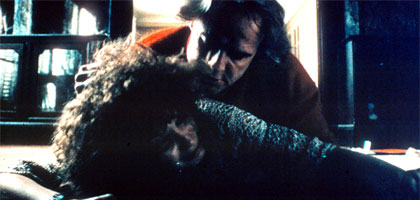
The Limits Of Sex

Patrice Chéreau's Intimacy reworks male mid-life-crisis stories by Hanif Kureshi into a tale of a woman's self-realisation through an anonymous affair. And it features real sex in a New Cross basement. By Richard Falcon. Plus Chris Darke talks to new mother Kerry Fox about on-screen sex and Richard Falcon asks Chéreau how to script an orgasm.
Are the BBFC arthouse snobs, asks Mark Kermode as 70s slasher classic The Last House on the Left is once again refused a UK certificate.
Baisé-moi is a new Thelma and Louise with more graphic violence and real sex. Linda Ruth Williams takes to the road.
Explicit screen sex has become integral to some of the most urgent and relevant new European films. Many of those cited below in Richard Falcon's article about Patrice Chéreau's Intimacy include penetration shots, and Chéreau's film itself - a London-set drama about a couple who meet once a week for anonymous sex - has already caused an outcry for showing Kerry Fox putting Mark Rylance's penis into her mouth. Denmark's Lars von Trier has been similarly confrontational in The Idiots, but explicitness seems a particular concern of the newer French directors. Other recent films from France that have not gained UK distribution, such as Ilan Duran Cohen's La Confusion des genres and Didier Le Pêcheur's J'aimerais pas crever un dimanche, are equally fascinated by the boundaries of screen sex. In Cannes this year the two most controversial works were both French productions designed to make us queasy about sex - Michael Haneke's The Piano Teacher and Claire Denis' Trouble Every Day.
The Haneke film is about a strict musical martinet played by Isabelle Huppert, who has a repressed yen for a much younger student. She indulges in genital self-harm with a razor and later gives her lover a list of ways she wants him to punish her sexually. Though Haneke is an Austrian director adapting an Austrian novel, there's a sense in which his film has to compete with the new norms of French cinema in order to affect the audience, especially at film festivals where shock is an effective strategy. There is no 'real' sex in this film, but the self-mutilation takes its place in shocking us. Denis has characters played by Béatrice Dalle and Vincent Gallo infected with a virus that makes them want literally to devour the people they fuck. Here too, the lashings of gore and the dental rapacity of the stars offer a substitute shock.
Apart from reflecting the prevalent turn-of-century mood in which the flipside of email solipsism is a post-religious fascination with the body, these French directors are also operating at a time when France is waking up to the sexual harassment of women in the workplace. The Chiennes de Guarde (Guard Bitches), an association designed to protect women from routine male abuse, has sprung up and the release of the female revenge movie Baise-moi seemed to match this new mood among French women questioning their role in the heterosexual equation. The film rocked the French establishment, raising a number of issues which Linda Ruth Williams explores on p.28. It stars porn actors and juxtaposes real sexual activity with fictional violence.
With both Intimacy and Baise-moi being released in the UK, the new-found tolerance of Britain's censors has been tested and might seem to be unshakeable, but Mark Kermode argues on p.26 that in having one rule for the likes of 'Baise-moi' and another for the banned US genre movie The Last House on the Left the BBFC is showing undue bias in favour of the arthouse and its middle-class audience. Intimacy is a much less controversial film that shoots sex - which Chéreau says he scripted to the point of orgasm (see p.24) - in a far from pornographic manner, but it raises questions about how far serious actors will be required to go. For Kerry Fox (see p.23) it was about braving out a truthful portrait of a sexual relationship, but also 'terrible to shoot'. Changing sexual mores have brought us back to a point where the border between the art film and the porn movie is more elastic. This series of articles explores the new screen attitudes at 'The Limits of Sex'.
